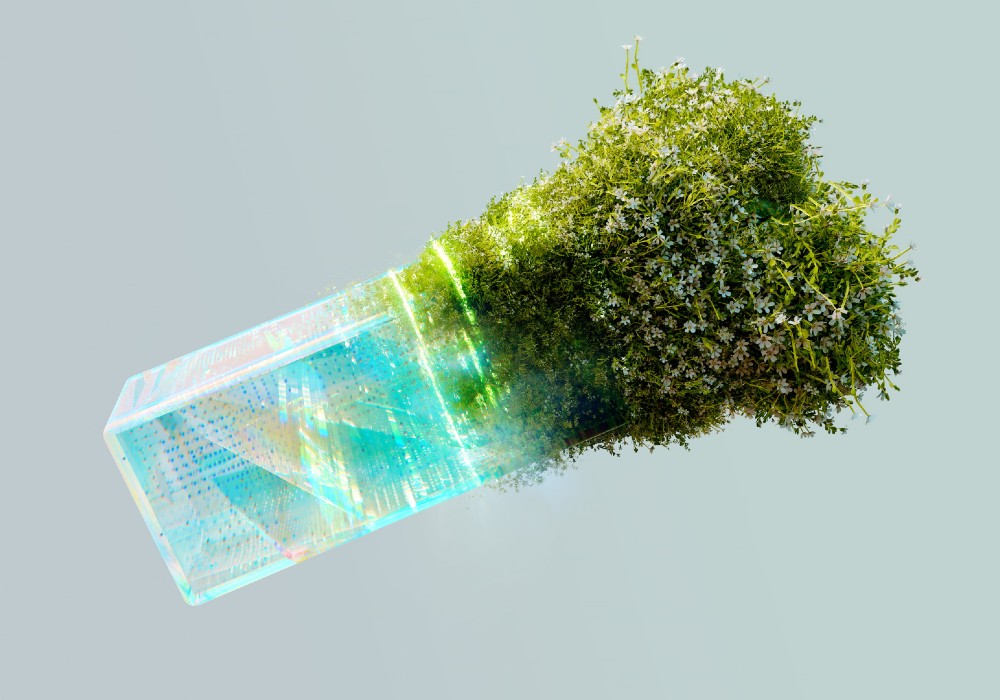Can AI Be the Key to Sustainable Progress?
In our fight against ecological challenges, AI steps up as a groundbreaking ally, synergizing sustainability with business growth.

Key takeaways from the article:
- AI is not only boosting efficiency across industries but also playing a significant role in tackling environmental challenges.
- Specifically, AI is enhancing waste management, optimizing energy consumption, and improving supply chain management with eco-conscious practices.
- Despite potential challenges such as ensuring data privacy, the future of AI promises significant job creation and continued contributions to sustainable economic growth.
In an age where technology has leapt beyond its basic functions, Artificial Intelligence (AI) has emerged from the realms of science fiction to become a palpable force, one that is reshaping the very fabric of human existence. It’s a tale of machines not just computing, but thinking, analyzing, and solving – reshaping our world at an extraordinary pace.
The Rise of AI: Beyond Imagination
In our world, constantly reshaping itself, the spotlight increasingly falls on groundbreaking tools like Artificial Intelligence (AI) and Machine Learning, igniting curiosity about their true impact on our daily lives. But let’s pause and unpack these concepts.
What exactly is AI? Imagine a realm of computer science dedicated to mimicking human intelligence. AI systems are designed to tackle tasks that typically require human sharpness – understanding languages, learning from experiences, or making decisions. It’s like infusing machines with a touch of human insight.
Machine Learning, in contrast, is a specialized segment of AI. It’s the process of teaching a machine to learn from data, almost like training a digital brain. Think of Machine Learning as the journey, a path leading towards the grand vision of AI. It’s not just about the destination; it’s about the innovative journey to get there.[1]
AI, merging Machine Learning with natural language processing, has accelerated capabilities far beyond human speed – certain AI devices can now perform as many calculations in a single second as an individual could in 31,688,765,000 years.[2] It’s a transformative power, driving industries toward an innovative future. The global AI market, as per estimates, is set to expand to an astonishing $407 billion by 2027.[3] In the realm of marketing, AI enables a nuanced understanding of consumer behavior, developing a more efficient and tailored customer experience.[4]
But AI’s scope extends further, intertwining with our vision for a sustainable future. Its ability to process and analyze vast amounts of data makes it an invaluable tool for understanding and addressing ecological challenges.
AI: A Catalyst for Sustainable Change
AI’s influence is far-reaching and profound, especially in the context of sustainability. It’s a game-changer in fields as diverse as agriculture, biodiversity conservation, and air pollution control. By 2030, AI’s contribution to reducing global greenhouse gas emissions is projected to be a remarkable 4%, akin to erasing the carbon emissions of Australia, Canada and Japan combined.[5]

Smart solutions for a sustainable tomorrow
Artificial Intelligence (AI) is subtly yet powerfully redefining our approach to sustainability. It’s happening now, in real-time, across varied sectors. Visionary organizations are harnessing AI’s capabilities, revolutionizing how they operate to become more resource-efficient and environmentally aware. AI stands out in its ability to sift through vast data, unveiling insights that enable companies to spot inefficiencies, anticipate trends, and, pivotally, make choices that underscore sustainability.
It’s in these applications and possibilities that AI’s true essence shines through – not just as a mere tool but as a driving force behind sustainable innovation and environmental guardianship.
The story of AI’s impact unfolds further as we observe the myriad ways businesses are tapping into the opportunities AI presents, all while fostering a sustainable footprint. It’s a narrative of technology and eco-consciousness intertwining to shape a smarter, greener future. Here are three examples of how it’s being used to do just that.
Revolutionizing Waste Management:
In the sphere of waste management, AI is playing a pivotal role. Companies like AMP Robotics are at the forefront, developing AI-driven solutions that dramatically improve recycling rates. By employing machine learning and computer vision, these systems enhance the efficiency and accuracy of sorting recyclable materials, effectively doubling the capacity of recycling facilities and slashing sorting costs by 50%.[6]
Energizing Energy Management:
In energy management, AI is making significant strides. An example is Johnson Controls, which has integrated AI into its building technology to optimize energy consumption. Their AI-powered “smart connected chillers” utilize real-time data and machine learning to adapt and optimize performance, resulting in energy savings of up to 35%.[7] This fusion of technology and sustainability not only benefits businesses financially but also significantly reduces their environmental footprint.
Sustainable Supply Chain Innovations:
AI’s influence extends to the heart of supply chain management. In the fashion industry, Stella McCartney stands out for sustainably leveraging AI. Using Google’s Cloud technology, the brand has gained deeper insights into its supply chain for essential materials like cotton and viscose. This AI-enhanced approach has led to better inventory management and a substantial reduction in overproduction, culminating in a more sustainable and efficient supply chain model.[8]
Even with its benefits, AI is not without its challenges
While AI’s potential in driving sustainability is immense, it’s not without its challenges. One of the primary concerns is data privacy. With AI’s reliance on vast data sets, there’s a growing unease about how this data is used and protected. A survey revealed that 74% of adults in the United States have expressed concerns regarding their data privacy with regards to AI technologies.[9]

In the quest for a sustainable and responsible AI future, the journey is not a solo one but a symphony of collaboration across various sectors. It’s about weaving a fabric of consciousness into the very core of AI. A report from McKinsey & Company on the ethical usage of AI underscores this narrative, spotlighting the crucial elements of transparency, accountability, and strong governance in AI development and application.[10]
Picture this: organizations embracing a transparent approach, demystifying how AI systems arrive at their predictions and ensuring that the quest for data does not overshadow consumer privacy. This mindset transforms AI from a mere technological marvel into a tool that’s ethically sound and user-centric. Understanding AI is not a luxury in this landscape; it’s a fundamental necessity. Echoing this sentiment, the Pew Research Center reveals that a significant 58% of American adults view grasping the inner workings of AI as essential.[11]
It’s a clear message: the path to AI’s future is paved with ethical consideration and a deep commitment to sustainability.
The future of AI: An eco-conscious vision
Looking forward, the role of AI in shaping a sustainable future is not just promising; it’s indispensable. It’s projected that AI could help create up to 38.2 million new jobs across the global economy by 2030.[12] The integration of AI across various domains is poised to be a critical factor in achieving sustainability goals, with the global AI market expected to grow by 37% annually from 2023 onwards.[13]
As we navigate the sustainability saga, AI emerges not just as a smart sidekick, but as the hero we didn’t know we needed. It’s turning the script of environmental tales on its head – one algorithm at a time. So, as AI rewrites our future in green code, we might just find ourselves sharing a knowing smile at the thought that once, creating a greener world with robots seemed like pure science fiction.
Watch the webinar “The Green Side of AI: Unlocking Sustainable Progress”
[1] “(AI) vs. Machine Learning.” Available at: https://ai.engineering.columbia.edu/ai-vs-machine-learning/
[2] “What is AI?” Available at: https://www.mckinsey.com/featured-insights/mckinsey-explainers/what-is-ai
[3] “24 Top AI Statistics and Trends In 2023.” Available at: https://www.forbes.com/advisor/business/ai-statistics/
[4] “Artificial intelligence (AI) applications for marketing: A literature-based study.” Available at: https://www.sciencedirect.com/science/article/pii/S2666603022000136
[5] “How AI can enable a sustainable future.” Available at: https://www.pwc.co.uk/services/sustainability-climate-change/insights/how-ai-future-can-enable-sustainable-future.html#:~:text=In%20parallel%20the%20application%20of,Australia%2C%20Canada%20and%20Japan%20combined.
[6] “AMP Robotics Launches Automated Secondary Sortation Facilities.” Available at: https://www.amprobotics.com/news-articles/amp-robotics-launches-automated-secondary-sortation-facilities-in-atlanta-and-cleveland
[7] Smart Connected Chillers: Monitor and Improve Performance from Anywhere.” Available at: “https://www.johnsoncontrols.com/en_sg/digital-solutions/smart-connected-chillers
[8] “Towards Sustainable Fashion: The Role of Artificial Intelligence.” Available at: https://www.researchgate.net/publication/351131240_Towards_Sustainable_Fashion_The_Role_of_Artificial_Intelligence_-_HM_Stella_McCartney_Farfetch_Moosejaw_A_Multiple_Case_Study
[9] “Share of adults in the United States who were concerned about issues related to AI.” Available at: https://www.statista.com/statistics/1378220/us-adults-concerns-about-artificial-intelligence-related-issues/
[10] “Leading your organization to responsible AI” Available at: https://www.mckinsey.com/capabilities/quantumblack/our-insights/leading-your-organization-to-responsible-ai
[11] “How Americans think about artificial intelligence.” Available at: https://www.pewresearch.org/internet/2022/03/17/how-americans-think-about-artificial-intelligence/
[12] “How AI can enable a sustainable future.” Available at: https://www.pwc.co.uk/services/sustainability-climate-change/insights/how-ai-future-can-enable-sustainable-future.html
[13] “Top Artificial Intelligence Statistics.” Available at: https://www.hostinger.com/tutorials/ai-statistics#:~:text=The%20Global%20AI%20Market%20Size,growing%20importance%20across%20all%20industries.
Author: Giuseppe Scandariato
Latest from the Blog